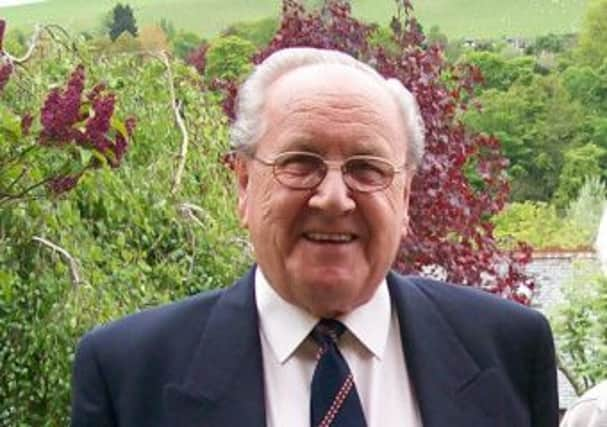Obituary: Captain Jack McDonald, soldier and businessman


CAPTAIN Jack McDonald first recognised the value of the regimental family as a 20-year-old national service corporal in Korea, when faced with the body of his friend Frank draped in a Union Flag.
Little more than an hour earlier, the platoon had gleefully sent up Frank’s disastrous attempts to cook their breakfast, bombarding him with the inedible results of his bid to bake scones – missiles they mistakenly considered more lethal than incoming Chinese artillery fire.
Advertisement
Hide AdAdvertisement
Hide AdThat same spirit of camaraderie and the bonds forged within the regiment sustained young McDonald in his loss that day in 1952 and throughout his subsequent soldiering in the King’s Own Scottish Borderers (KOSB). Fifty years later, he was still fighting to preserve that esprit de corps, which he feared would be wiped out with the amalgamation of the regiment under government spending cuts.
He fervently believed that that bond was not only the glue that held a regiment together but also that it was a crucial element in its success in battle, and was passionately opposed to the politicians’ determination to merge the regiment he had served for more than 20 years.
Born in Stirling and educated at the Territorial and Riverside Secondary Schools, he was called up for national service at 18. He was posted to the Argyll and Sutherland Highlanders, completing his initial training at Fort George near Inverness.
Two years later, he was off to Korea serving alongside the men of the King’s Own Scottish Borderers. Fellow national serviceman Frank North was duty cook the morning he was killed. McDonald had just had his monthly bath at tactical HQ when the padre announced he was going to say a few words over that morning’s KIAs – those killed in action.
“As I stepped outside, I was again face to face with my friend Frank, only this time I was looking at the soles of his boots, the rest of him being covered by a Union Jack,” he recounted.
“I learned first-hand what it was like both to lose a friend, and to recognise war for the waste it would always be, whatever reason was given for its waging. I think this was where I first learned about the spirit of the regimental family, where the mourning for Frank, and the gratitude for his comradeship, was felt and shared by us all.”
After two years in Korea, he returned home and met again with the girlfriend he had left behind, Jean Napier. A posting to Ireland followed before he was sent to serve against the Malayan National Liberation Army during the Malayan Emergency.
The army agreed to fly Jean out to Singapore where, on 9 June, 1956, they were married by the army chaplain. Two years later, their first son arrived, followed a year later by a second son, by which time McDonald had been posted to Berlin.
Advertisement
Hide AdAdvertisement
Hide AdThe family then moved to Redford Barracks at Colinton, Edinburgh, before heading out to Aden, Yemen. Their next posting was to Stranraer, where he had a recruiting role with the Territorial Army. By the time they left for Folkstone, there had been another addition to the family – a daughter. Soon the family was on the move again, back up to Dumfries in 1968.
When McDonald subsequently went to Osnabrück in Germany, the family joined him for two years. His final posting was back to the south of Scotland as a recruitment officer.
After more than two decades in the service, he left the army in the 1970s with the rank of captain and he and Jean settled in Galashiels, where a new working life awaited on civvy street. He became export manager at the Laidlaw & Fairgrieve woollen mill, a role which involved a good deal of travel, before moving firstly to Bepe’s electronics company and later to Ballantyne’s cashmere mill at Innerleithen, to posts as personnel manager. In tandem with his paid employment, he and a business partner also set up and ran a company, Cruachan, manufacturing ladies and gents clothing.
When he finally retired, there was still plenty to be getting on with: gardening, constant monitoring of politics on television, reading thrillers and army-related books – and campaigning to keep the KOSB.
Having led by example and been the epitome of loyalty to his men and his regiment, he was angry at the threat to the regiment from what he described as “political bean counters” whose scheme he feared would “quickly deteriorate into an amorphous mass of soldiery, without pride in their being, or any sense of belonging to anyone”.
Remembering the bonds forged through soldiering, he wrote on the Britain’s Small Wars online forum: “You cannot hope to convert those who have never experienced the esprit de corps of the regimental family to an understanding of its place in the brotherhood of infantry soldiers, where loyalty to regiment and comrades transcends all else, and remains with those fortunate enough, to be part of it for the rest of their lives.”
Despite petitioning the UK government to reverse the decision to subsume the KOSB into the Royal Regiment of Scotland, it was ultimately one battle he and fellow campaigners didn’t win. They did, however, go down fighting.
McDonald maintained a determination not to be defeated even in his final fortnight, starting the New Year delighted that his army jacket could still button up beautifully, his pride at being a Borderer still at his core. He is survived by his wife Jean, their children Duncan, Stuart and Gillian, and extended family.